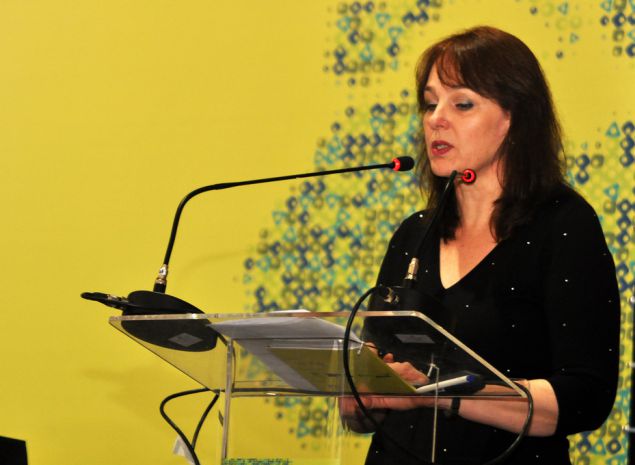Send to a friend
The details you provide on this page will not be used to send unsolicited email, and will not be sold to a 3rd party. See privacy policy.
South Africa-born social scientist Heide Hackmann took the reins of the International Council for Science (ICSU) in March last year. That was a turbulent time for the council: just months before Hackmann became its executive director, an external review flagged up governance problems and slammed the organisation’s lack of vision, which, it said, meant there was a serious risk that ICSU will “wither on the vine and become irrelevant over the next few years”. [1]
In this interview, Hackmann tells SciDev.Net how ICSU is addressing these criticisms and explains the truth behind rumours of a merger between the organisation and the International Social Science Council, which she directed from 2007 until she moved to ICSU.
What have you done to follow up on the report by the external review panel?
What was very clear from the review is that, if you look at the international science landscape, there’s a great deal of fragmentation. ICSU and the global network of science academies (IAP) for example have overlapping missions and memberships in many ways.
We took the lead in launching a series of international meetings, known as Science International, that bring together the leadership of these bodies — including ICSU, IAP, the International Social Science Council and the World Academy of Sciences for the advancement of science in developing countries. We had a launch meeting last month in South Africa and agreed to support an accord on open data.
Science International is not a new organisation, but it’s creating a platform where international organisations can speak with a single voice. We can now engage for example with forums of governments and funding agencies. We can discuss the changes we need to make it possible for scientists to contribute to policy. That’s been an arena where we’d been quite silent.
What makes ICSU stand out from these other organisations?
ICSU has a unique membership base, both in terms of global and in terms of combining national bodies and international scientific unions. We need to figure out how best to exploit that. We are entering a planning phase in 2016, to launch a strategic plan at the end of 2017. What will not change is that we exist to mobilise and integrate international research efforts around key global challenges.
Since several of these organisations’ memberships overlap, have there been talks about possible mergers?
There has been a rumour going around that ICSU and the International Social Science Council were coming together. We are currently looking at how both councils can develop closer institutional alignments. We will set up a joint working group to develop scenarios for how the two organisations could align themselves for activities and institutional support mechanisms. Those scenarios are wide open: you could imagine that one scenario could be an eventual merger, but it’s very important to say that this rumour that we were merging is premature.
Some member organisations left or threatened to leave ICSU. What have you done to address their concerns?
We are taking actions to draw on our membership much more in terms of launching new initiatives and having influence. For example, the open data accord (signed in Pretoria, South Africa, in December) is not something we just sign and move on from: we’re launching a campaign to engage our membership in follow-up actions. For example, we will urge scientific unions and associations to pick up issues and look at how they can influence national science policy [in these areas].
Another example would be our ICSU grants programme. We are essentially redesigning it to enable clusters of scientific unions to work together on longer-term, more visible initiatives rather than giving them many small grants that would fund individual workshops. We’re trying to use the grants programme more effectively to put our members in the lead.
Are you planning changes to ICSU’s governance structure?
The basic governance structure hasn’t changed, but part of the challenge of becoming a truly global voice of science means that we might have to review some of our membership structures. For example, we need to develop a strategy to ensure that early-career scientists are well represented, and this year we will develop a gender policy.
How about engaging with science in developing countries?
This is one of our priorities, again in response to the external review. We need to understand what we want from our regional offices [in Malaysia, Mexico and South Africa]. We need to do more to strengthen our visibility and presence, and to secure access to international activities for research communities in low- and middle-income countries. Capacity-building has often focused on fellowships and individual grants — which are extremely important — but there’s also a role for us [at a higher level], to develop strong science systems. For example, how do we influence governments in terms of investing in science?
How will ICSU contribute to policy challenges in the coming years?
We want to strengthen our role in securing scientific input in a number of big UN policy frameworks — on climate change, the Sustainable Development Goals, the Sendai Framework for Disaster Risk Reduction, etc. ICSU has a leading role in coordinating the scientific and technological communities within the UN major group system.
We’ve got to work on climate change, poverty eradication, social conflict, etc. all at the same time because they’re all interconnected, huge, unprecedented issues. Some of the responses we’ve seen to these challenges are new methodologies called transdisciplinary research, co-design or coproduction of knowledge, where researchers from different disciplines and countries are getting involved. How do we build new partnerships between science, civil society organisations, industry and policy? Are these new approaches making a difference? Where does it leave space for basic research? I think the onus is on organisations like ICSU and its partners to understand what all this means for how we practice and support science.Q&As are edited for brevity and clarity.














